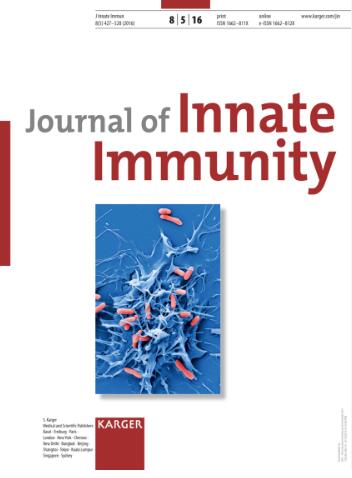肺炎链球菌通过溶血素阻碍人树突状细胞的成熟和CD4+T细胞的活化
IF 4.7
3区 医学
Q2 IMMUNOLOGY
引用次数: 4
摘要
甲型流感病毒(IAV)、金黄色葡萄球菌(葡萄球菌)和肺炎链球菌(肺炎球菌)是导致肺炎的主要病毒和细菌原因。树突状细胞(DC)存在于下呼吸道中。它们的特征是共刺激分子(包括CD80和CD86)的低表达和高抗原摄取能力。随后,DC上调共刺激信号和细胞因子分泌,以有效诱导T细胞启动。在这里,我们使用人单核细胞衍生的(mo)DC研究了这些对细菌和病毒单一感染以及共同感染的反应过程。无论是单一感染还是合并感染,moDC都会对IAV和/或葡萄球菌感染作出反应而成熟,分泌广泛的细胞因子,并激活CD4+、CD8+以及双阴性T细胞。相反,肺炎球菌单感染和合并感染损害了moDC的成熟,其特征是CD80和CD86的低表达、CD40的表达下调以及导致CD4+T细胞活化消除的轻度细胞因子释放。这些作用归因于胆固醇依赖性细胞毒素肺炎球菌溶血素(Ply)。ply缺陷突变体的感染导致moDC成熟恢复和CD4+T细胞的独家激活。这些发现表明Ply具有重要的免疫调节功能,支持对Ply-DC相互作用的特定模式的进一步研究。本文章由计算机程序翻译,如有差异,请以英文原文为准。
Streptococcus pneumoniae Impairs Maturation of Human Dendritic Cells and Consequent Activation of CD4+ T Cells via Pneumolysin
Influenza A Virus (IAV), Staphylococcus aureus (staphylococci), and Streptococcus pneumoniae (pneumococci) are leading viral and bacterial causes of pneumonia. Dendritic cells (DCs) are present in the lower respiratory tract. They are characterized by low expression of co-stimulatory molecules, including CD80 and CD86 and high capacity of antigen uptake. Subsequently, DCs upregulate co-stimulatory signals and cytokine secretion to effectively induce T-cell priming. Here, we investigated these processes in response to bacterial and viral single as well as coinfections using human monocyte-derived (mo)DCs. Irrespective of single or coinfections, moDCs matured in response to IAV and/or staphylococcal infections, secreted a wide range of cytokines, and activated CD4+, CD8+ as well as double-negative T cells. In contrast, pneumococcal single and coinfections impaired moDC maturation, which was characterized by low expression of CD80 and CD86, downregulated expression of CD40, and a mild cytokine release resulting in abrogated CD4+ T-cell activation. These actions were attributed to the cholesterol-dependent cytotoxin pneumolysin (Ply). Infections with a ply-deficient mutant resulted in restored moDC maturation and exclusive CD4+ T-cell activation. These findings show that Ply has important immunomodulatory functions, supporting further investigations in specific modalities of Ply-DC interplay.
求助全文
通过发布文献求助,成功后即可免费获取论文全文。
去求助
来源期刊

Journal of Innate Immunity
医学-免疫学
CiteScore
10.50
自引率
1.90%
发文量
35
审稿时长
7.5 months
期刊介绍:
The ''Journal of Innate Immunity'' is a bimonthly journal covering all aspects within the area of innate immunity, including evolution of the immune system, molecular biology of cells involved in innate immunity, pattern recognition and signals of ‘danger’, microbial corruption, host response and inflammation, mucosal immunity, complement and coagulation, sepsis and septic shock, molecular genomics, and development of immunotherapies. The journal publishes original research articles, short communications, reviews, commentaries and letters to the editors. In addition to regular papers, some issues feature a special section with a thematic focus.
 求助内容:
求助内容: 应助结果提醒方式:
应助结果提醒方式:


